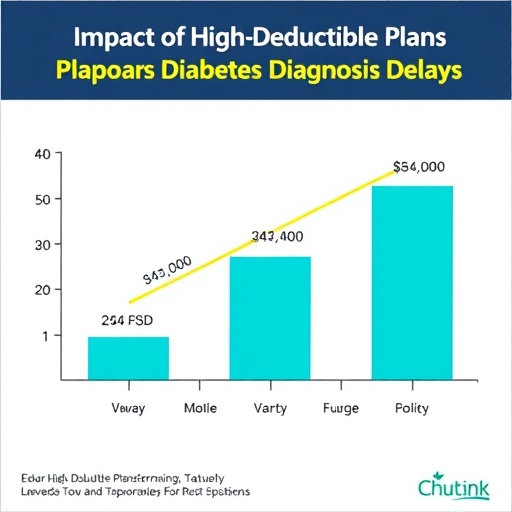
The rising prominence of high-deductible health plans (HDHPs) has become a significant topic of concern among healthcare professionals, policymakers, and patients alike. With the increasing push towards cost-sharing healthcare models, there is growing evidence that these plans may inadvertently lead to delays in the diagnosis of critical health conditions. A recent study published in the Journal of General Internal Medicine sheds light on this alarming trend, providing data-driven insights into how enrollment in HDHPs can postpone the diagnosis of diabetes, a condition that necessitates timely intervention for optimal patient outcomes.
Diabetes, often dubbed a silent killer, is a chronic disease that comes with severe health implications if not diagnosed and treated promptly. It is associated with a range of complications from cardiovascular disease to kidney failure, highlighting the importance of early detection. The study conducted by Marcondes and colleagues meticulously examined the correlation between the enrollment in HDHPs and the timing of diabetes diagnosis, offering a pre- and post-enrollment perspective. This research not only brings awareness to a pressing issue but also urges stakeholders to reconsider the implications of HDHPs on patient health.
The methodology employed in the study is robust and comprehensive. It involved a sample population that was reviewed to ascertain the timeline of diabetes diagnosis before and after the transition to a high-deductible health plan. By utilizing comparative data, the researchers aimed to identify any significant changes in diagnosis timing that could be directly associated with the financial barriers imposed by HDHPs. The findings are startling: individuals enrolled in HDHPs experienced notable delays in their diabetes diagnoses compared to those under traditional insurance plans.
One of the key takeaways from this investigation is the financial barrier effect characterized by high deductibles. Patients with HDHPs often face significant out-of-pocket expenses when seeking preventive care or necessary screenings. Consequently, many may defer visits to healthcare providers, prioritizing immediate financial burdens over their health. This behavior can lead to undiagnosed conditions worsening over time, potentially resulting in longer-term health complications and escalating healthcare costs down the line. Understanding this dynamic is crucial for both practitioners and patients navigating the healthcare landscape.
In detailing the results, Marcondes and his team illuminated how these delays in diagnosis can perpetuate a vicious cycle of health deterioration. The study indicated a direct correlation between increased deductible costs and longer delays in diabetes detection. Specifically, findings suggest that individuals hailing from lower socioeconomic backgrounds are disproportionately affected by these delays, as they often face more significant financial constraints preventing timely medical visits. This raises questions about the equity of healthcare access in systems heavily reliant on high-deductible plans.
Moreover, the implications of delayed diabetes diagnosis extend beyond individual health outcomes. The broader public health impact cannot be overstated, as unmanaged diabetes can result in higher overall medical costs due to emergency interventions, inpatient hospitalizations, and the management of complications. Therefore, the study advocates for a reevaluation of insurance options available to patients, emphasizing the potential risks of policies that prioritize cost-sharing over comprehensive healthcare access.
The researchers further highlight how the current healthcare landscape can be reformed to mitigate these concerns. They propose policy recommendations that seek to balance the financial sustainability of healthcare systems while ensuring equitable access to necessary medical attention. Importantly, the study emphasizes the need for increased awareness among patients regarding their insurance plans and the potential ramifications of high deductibles. Education on these financial models can empower patients to make more informed decisions about their healthcare.
Additionally, the importance of interdisciplinary communication among healthcare providers is addressed. Health professionals need to be vigilant and proactive in identifying patients who may be at risk for delays in diagnosis due to financial barriers. Engaging in deeper discussions during visits can serve to illuminate patients’ concerns around costs and motivate timely screenings and preventative measures. The role of healthcare providers in fostering patient-centered care cannot be understated, particularly in the context of high-deductible health plans.
In light of these findings, the study calls for further research to explore long-term health outcomes among patients enrolled in HDHPs. Investigating the effects beyond the immediate scope of diabetes diagnosis could yield valuable insights into how these plans affect the management of chronic diseases and preventive care in a broader context. With the increasing variability of health insurance models, understanding these outcomes is paramount to ensuring that healthcare remains accessible and effective for all individuals, regardless of their insurance status.
The study not only contributes to the existing body of medical literature but also serves as a clarion call for policymakers, health insurers, and healthcare professionals alike. As the United States continues to grapple with the implications of high-deductible health plans, it is vital to incorporate patient health outcomes into discussions surrounding insurance reforms. Ensuring that patients can access timely medical care, free from the constraints of financial burden, is foundational for improving public health outcomes and creating a more equitable healthcare system.
In conclusion, the research conducted by Marcondes and associates opens a critical dialogue about the intersection of health economics and patient care. As high-deductible health plans become increasingly prevalent, understanding their impact on health outcomes, particularly concerning severe chronic conditions like diabetes, is more critical than ever. The ramifications of delaying crucial diagnoses could be vast, affecting not only individual health trajectories but also the broader healthcare landscape. A concerted effort among all stakeholders is crucial to address these challenges, ensuring that financial mechanisms in healthcare do not impede access to timely and necessary care.
This study stands as an invaluable resource for stakeholders navigating these evolving healthcare dynamics. Through its thorough examination of HDHPs and their consequences on diabetes diagnosis, it provides essential insights into a pressing public health issue. As we look toward the future of healthcare financing and delivery, the lessons derived from this research must inform the policies and practices that shape the experiences of patients in our healthcare systems.
Subject of Research: The impact of high-deductible health plan enrollment on diabetes diagnosis delays.
Article Title: Delay in Diabetes Diagnosis After High-Deductible Health Plan Enrollment: A Pre-Post Study with Control.
Article References:
Marcondes, F.O., Zhang, F., Ross-Degnan, D. et al. Delay in Diabetes Diagnosis After High-Deductible Health Plan Enrollment: A Pre-Post Study with Control.
J GEN INTERN MED (2025). https://doi.org/10.1007/s11606-025-09813-y
Image Credits: AI Generated
DOI: 10.1007/s11606-025-09813-y
Keywords: high-deductible health plans, diabetes diagnosis, healthcare access, financial barriers, public health.
Tags: chronic disease managementdata-driven healthcare researchdiabetes complications and treatmentdiabetes diagnosis delaysearly detection of diabetesenrollment in HDHPshealthcare cost-sharing modelshealthcare policy and diabeteshigh-deductible health plans impactimplications of health insurance planspatient outcomes and health plansstudy on diabetes diagnosis




